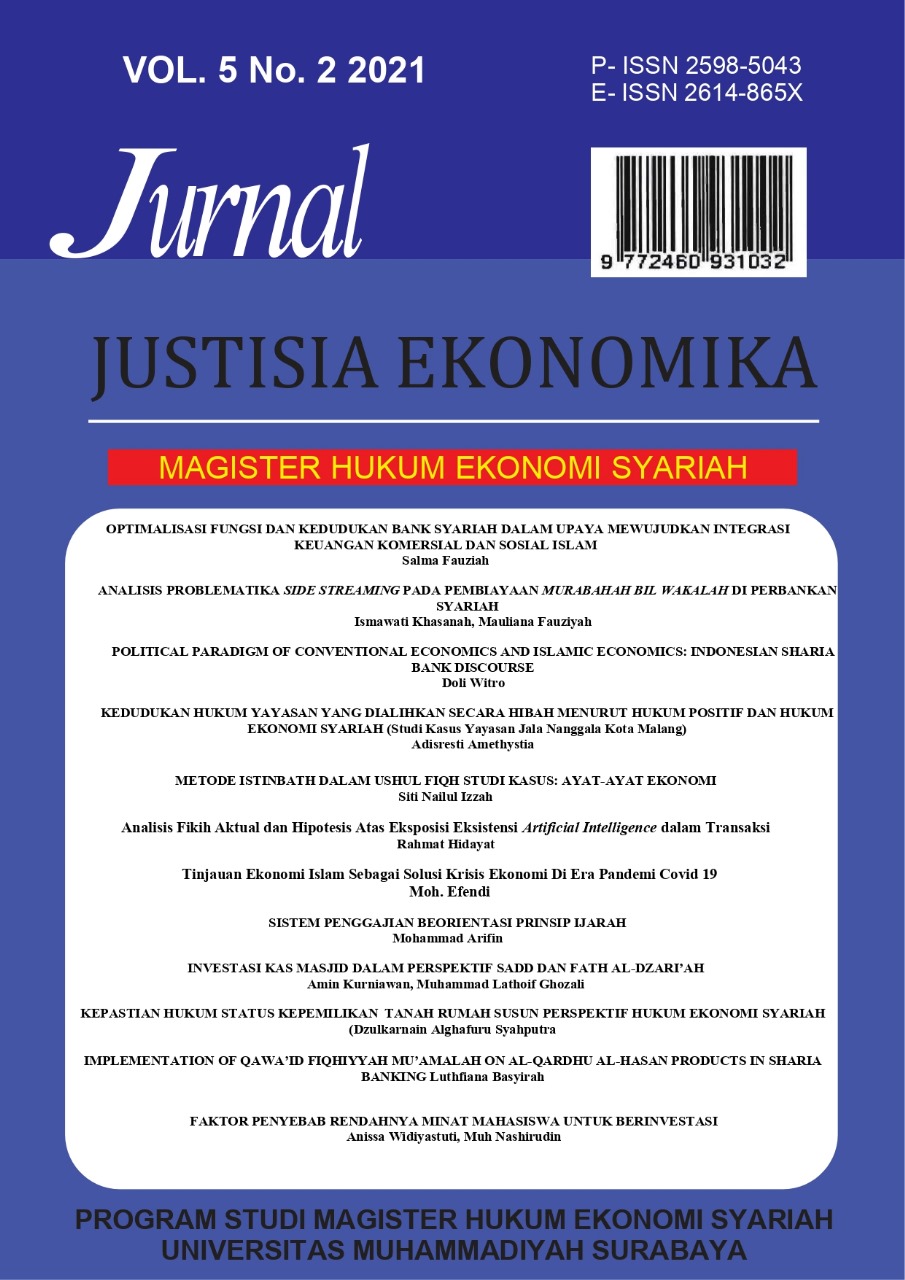KEPASTIAN HUKUM STATUS KEPEMILIKAN TANAH RUMAH SUSUN PERSPEKTIF HUKUM EKONOMI SYARIAH
DOI:
https://doi.org/10.30651/justeko.v5i2.10690Abstrak
The developer of the apartment is allowed to sell the apartment unit that has not been completed after fulfilling the requirements and obligations as regulated in Article 43 paragraph (2) of the Flats Law. This study aims to analyze and find the accuracy of using Article 378 of the Criminal Code to adjudicate violations of Article 43 paragraph (2) of the Flats Law related to the certainty of land ownership status as the basis for making PPJB and criminal responsibility for notaries against the occurrence of criminal acts in the deed he made related to with the principle of prudence of a notary in carrying out his office. The research method used in this study is normative juridical law research, the approach method used is the statutory regulation approach and the conceptual approach as well as the case approach. From the results of the research and discussion, it can be concluded first: the use of Article 378 of the Criminal Code which is applied to violations of Article 43 paragraph (2) of the Flats Law is inappropriate. The appropriate article for the violation is Article 110 of the Flats Law. Second: For criminal acts that are contained in a notary deed, it can cause the notary to be held criminally responsible for participating in helping the occurrence of a crime. In Sharia Economic Law, land ownership in flats includes haq al-jiwar which is included in the realm of al-irtifaq rights, where every occupant of the flat is entitled to the land where the house they live in is built. Therefore, the use of land should be by mutual agreement of all occupants or owners of the flat. If there is a violation of shared land use, sharia economic law does not clearly state the sanctions, but according to the author, sanctions in such land use violations are more related to tahzir punishments (orders) only, and do not reach the realm of Islamic criminality (hudud).
Keywords: flats, violation, criminal, Haq al-Irtifaq.
Â
Referensi
Kitab Undang-Undang Hukum Perdata (Burgerlijk Wetboek Voor Iindonesie) Staatsblaad Tahun 1847 Nomor 23.
Kitab Undang-Undang Hukum Pidana (Wetboek van Strafrecht)
Undang-Undang Nomor 30 Tahun 2004 tentang Jabatan Notaris sebagaimana telah diubah dengan Undang-Undang Republik Indonesia Nomor 2 Tahun 2014 tentang Perubahan atas Undang-Undang Nomor 30 Tahun 2004 tentang Jabatan Notaris.
Undang-Undang Republik Indonesia Nomor 20 Tahun 2011 tentang Rumah Susun (Lembaran Negara Republik Indonesia Tahun 2011 Nomor 108).
Peraturan Pemerintah Republik Indonesia Nomor 14 Tahun 2016 tentang Penyelenggaraan Perumahan Dan Kawasan Permukiman sebagaimana telah diubah dengan Peraturan Pemerintah Nomor 12 Tahun 2021.
Siswono Judohusodo, 1991, Rumah Untuk Seluruh Rakyat, (Jakarta: Inkoppol Unit Percetakan Bharakerta).
Peter Mahmud Marzuki, 2019, Penelitian Hukum, Cetakan 14, (Jakarta: Kencana Prenada Media Group).
Urip Santoso, 2014, Hukum Perumahan, (Jakarta: Kencana).
Philipus M.Hadjon, 1987, Perlindungan Hukum Bagi Rakyat Indonesia, (Surabaya: Bina Ilmu, Surabaya).
Philipus M. Hadjon dan Tatiek Sri Djatmiati, 2008, Pengantar Hukum Adminstrasi Negara, (Yogyakarta: UGM Pers).
Ghansham Anand, 2018, Karakteristik Jabatan Notaris Di Indonesia, (Jakarta: Kencana).
Unduhan
Diterbitkan
Cara Mengutip
Terbitan
Bagian
Lisensi
HAK CIPTA
Penulis yang mengirimkan artikel dalam jurnal Justisia Ekonomika harus memahami dan menyetujui persyaratan tentang hak cipta jurnal Justisia Ekonomika sebagai berikut:
1. Hak Cipta tulisan / artikel yang diterbitkan di jurnal Justisia Ekonomika otomatis menjadi hak pengelola jurnal atau publisher
2. Meskipun Hak Cipta atas tulisan yang telah diterbitkan di jurnal Justisia Ekonomika adalah menjadi haknya publisher, tetapi penulis masih mempunyai hak untuk : a). Penulis boleh meng-upload di repository kampus, b). Penulis boleh meng-upload di webnya sendiri, c). Penulis boleh meng-upload di google schoolar, orchid dan sinta
LISENSI
Lisensi atas tulisan / artikel yang diterbitkan di jurnal Justisia Ekonomika adalah menggunakan Creative Commons dengan atribusi CC-BY-NC 4.0






















